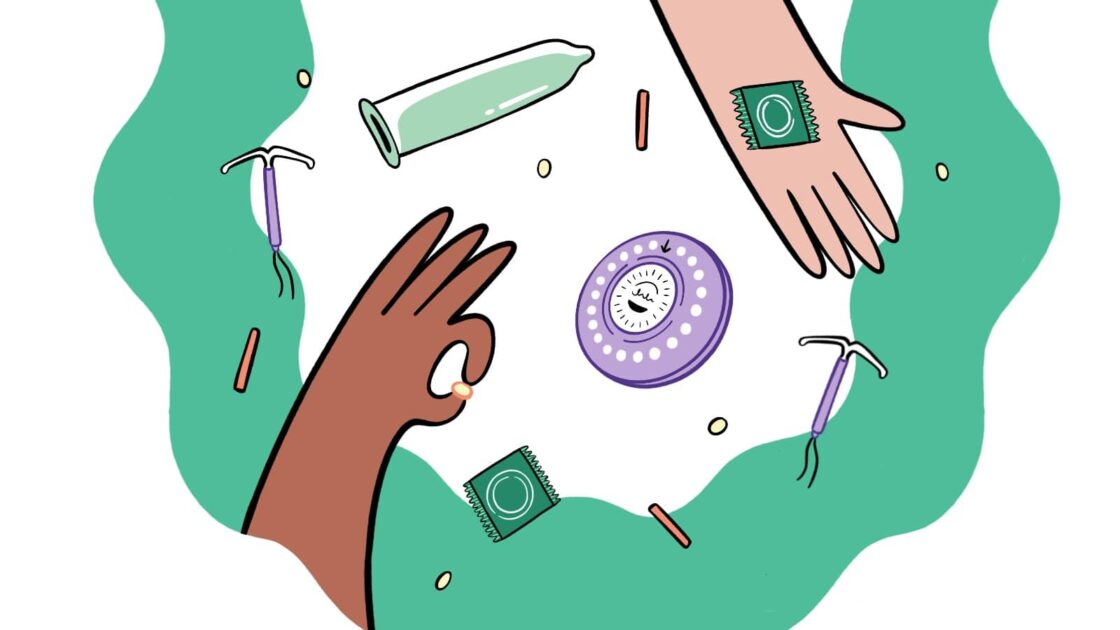Who is responsible for making sure contraception is used
While some may hold onto traditional ideas when it comes to who is responsible for contraception, Tia highlights how everyone needs to play their part in making sexual experiences safer.

Contraceptives come in a variety of forms, such as condoms, dental dams, IUD/S, and many more. They can offer protection against sexually-transmitted infections (STIs), and also against unwanted pregnancies. While not one hundred percent effective, the use of them is important and can help you (and potential sexual partners) stay safe.
A question that arises in the talk on the use of contraceptives is over who should take on the role of making sure they are used during sex.
Some people believe that women, or those with a vagina, should take on the responsibility, as it may be easier to avoid the fertilisation of a single egg than to manage millions of sperm cells. However, some people believe that men, or those with a penis, should take on the responsibility as it may be more efficient to focus on an individual who could potentially impregnate many individuals over the course of a year.
However, pregnancy isn’t a potential outcome of every instance of sex. Same-sex, trans and non-binary couples exist, and intercourse can occur regardless of the specific genitials of each participant.
A universal truth of sex
When we think of who should take on the responsibility, we must acknowledge that a universal truth of sex, regardless of genders of the participants, is that STIs can be spread, and nobody wants to accidentally catch or transmit them.
Everyone should take on the responsibility of ensuring contraceptives are used during sex. The availability of certain types can vary, but for the most part condoms and dental dams can be bought at most pharmacies, whereas you may need to go to your GP for contraceptives such as the pill, and IUDs.
Mosy condoms are made out of a thin latex, and are used over penises or sex toys. They can help prevent the spread of STIs between partners through vaginal, oral, or anal sex. Condoms also offers protection against unwanted pregnancies.
Dental dams are made out of latex and are spread over the vagina or anus and help prevent the spread of STIs that can occur during oral sex.
Taking responsibility
Regardless of what form of contraception is used, people should understand that we all play a role in ensuring our own safety during sex. Communicate with partner(s) beforehand to set boundaries and ensure that consent is present at all times.
Some people may be wary of the use of contraceptives for numerous reasons, and that is something that should be talked about with any potential sexual partner. There is a common misconception that the use of contraceptives, in particular condoms, can limit sexual pleasure for those involved. Talking with any potential sexual partner can help clarify these misconceptions, alongside other worries, and allow you to be on the same footing as everyone involved.
Let’s talk about sex
It can be difficult having these discussions, but it is also really important to do so. A general rule of thumb that can be followed, is that if you don’t feel comfortable with discussing topics such as contraceptives and consent with your partner, then perhaps you shouldn’t consider having sex. It is best to always trust your partner, and for them to trust you, to ensure that anything that could happen as a result of sex is thought of beforehand.
There is no one way of having sex, and there is also no one type of couple engaging with sex. Talking with any potential partner or partners before having sex, can be vital in establishing clear boundaries that keep everyone involved safe and feel listened to and supported. As Salt-n-Pepa say “Let’s talk about sex!”
This piece is part of ‘Under the Sheets‘, the National Action Panel’s Voices campaign to raise awareness of the importance of unbiased fact-based inclusive sex education for all young people. Access more information and supports for sexual health.
Illustrations by Ezra Pinkerton.
Feeling overwhelmed and want to talk to someone?
- Get anonymous support 24/7 with our text message support service
- Connect with a trained volunteer who will listen to you, and help you to move forward feeling better
- Whatsapp us now or free-text SPUNOUT to 50808 to begin.
- Find out more about our text message support service
If you are a customer of the 48 or An Post network or cannot get through using the ‘50808’ short code please text HELLO to 086 1800 280 (standard message rates may apply). Some smaller networks do not support short codes like ‘50808’.






